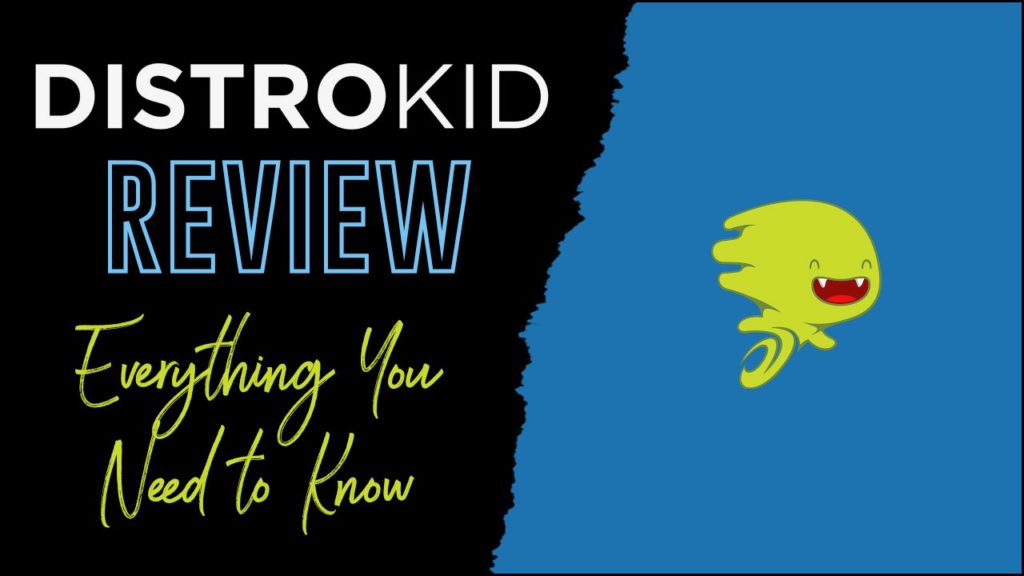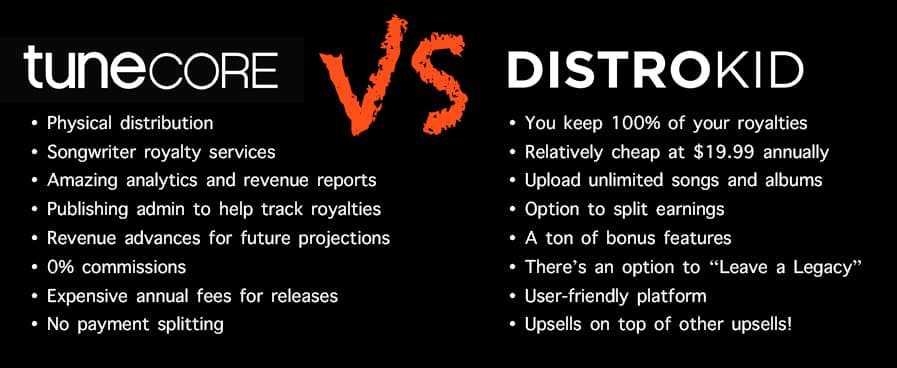I’ll go out on a limb and say it…the recorded-music industry (i.e., major record labels) are succumbing to the liberating wave of DIY acts or independent artists. The facilitators? Music streaming services like Spotify, Apple Music, Amazon Music, YouTube, et. al.—with the backing of digital distribution companies such as DistroKid.
If you give two cents about the current state of the music industry, then you’re probably well-aware that music distribution companies are now the go-to avenue for both recording and independent artists to get their music out into the world and collect royalties. Their appeal stems from their low costs, speed of distribution, and the fact that they don’t own your rights.
And as with any industry, not all music distribution companies are made equal – i.e., some shine brighter than others. Here’s what I mean…When you think of a soft drink, it’s likely Coca Cola—same with Jack Daniel’s with whisky; Uber with ride-sharing apps, Airbnb with accommodation services, and DistroKid with online music distribution companies. These are players who sit at the pinnacle of their respective industries.
But popular does not always translate to great (*go ask Comcast, Monsanto, or Electronic Arts). So, is DistroKid worth it? As an independent artist, should you potentially hinge your music career on the distribution company? And how does DistroKid compare to its competitors? Read on for answers to these questions and more.
PS: This comprehensive DistroKid review is based on my personal experience uploading music through the different platforms and an in-depth analysis of a ton of other online reviews on the topic.
DistroKid? – Background and Reputation
For some, DistroKid is an industry disruptor that banks on its innovative approach to pull aspiring and established artists by the masses. To others, it’s the crème de la crème of the online music distribution industry. But most artists recognize it as the widely convenient music distributor with an amoeba-looking logo (*okay maybe that’s just me).
“DistroKid is the future.”
—Ludacris
According to a blog post by Philip Kaplan (Founder, CEO of DistroKid, and a Heavy metal drummer), the company lays claim to 33% of all new music distributions around the globe. He also claims that “We’re told by labels — major and indie — that the bulk of new artists they sign use DistroKid.” Honestly speaking, these are pretty bold claims—but I’d be demented not to see a speck of truth in the metrics.
Since it’s lowly launch in 2013 as part of the social media network Fandalism, DistroKid has catapulted itself to the very top of the industry. Facing stiff competition from already-established players like CD Baby and TuneCore, DistroKid found a firm footing by actually offering what independent artists needed—a cheap, fast, no-fluff (i.e., simple, thoughtful), and reliable medium that allows them to upload as much music as they want.
As a testament to the company’s reputation, the largest music streaming service (aka., Spotify) bought a minority stake in DistroKid. In layman terms, this translates to, “the folk at Spotify have high hopes for the future of DistroKid and they’re willing to put their money on it.”
And for good measure, here’s what Jeff Price (Founder of TuneCore) tweeted a few years back: “As the founder of TuneCore I hate to say it but #distrokid is the single best music distribution company in the world. Light years ahead of CD Baby and TuneCore and far less expensive.” Yea, yea; I know what you’re thinking. This also raised my eyebrow—considering Jeff Price is no longer with TuneCore—but still…
How Much Does DistroKid Charge to Get My Music into Online Stores?
To rephrase the topic question; what is the pricing structure of DistroKid? Or how much does DistroKid cost? As highlighted earlier, their price point is one of DistroKid’s main selling point–literary. The value for money they offer is simply phenomenal. Here are their annual prices as stated on their website:
| DistroKid Pricing Plan | Number of Artists/Bands | Price |
| Musician | 1 artist/band | $19.99 |
| Musician Plus | 2 artists/bands | $35.99 |
| Label 5 | 5 artists/bands | $79.99 |
| Label 10 | 10 artists/bands | $139.99 |
| Label 20 | 20 artists/bands | $239.99 |
| Label 50 | 50 artists/bands | $599.99 |
| Label 100 | 100 artists/bands | $1,199.99 |
This already looks like a steal in music distribution standards—but there’s more. The $19.99 annual price allows you to upload unlimited albums and songs (take a moment to let the magnitude of that offering sink in). For the literal price of a Starbucks coffee, you can send out as many songs are you can conjure—it doesn’t matter if its 2 tracks of 30, the price stands.
“A million-dollar record label for $20 with DistroKid”
—Performer Magazine
Each of the DistroKid price plans has different features in addition to the number of artists/bands. For example, the Musician Plus tier allows you to customize the release date of your music, the pre-order date, and so on.
By now you must be wondering: “How does DistroKid manage to keep their prices so low? What’s the catch?” Well, you only need to look at the features offered in each price category to find out. The trick lies in thinning out the features—leaving only the most essential ones. If you want more functionality, you have to dig a little deeper to buy add-ons.
DistroKid Add-Ons
When you’re uploading your tracks and albums with DistroKid, the music distributor attempts to ‘woo’ you into subscribing to one or a couple of their paid add-ons.
Some of the add-ons include iPhone Siri and Shazam ($0.99), YouTube monetization ($4.95 per single or $14.95 per album), Store Maximizer ($7.95), Cover Song Licensing ($12), and Leave a Legacy ($49.00 per album or $29.00 per single).
Some users consider DistroKid add-ons as a drawback and a sort of trap—but is it? Let’s approach the matter objectively for a second. This is a company that is basically giving you an option to cherry-pick the services you need depending on your unique music career, rather than stuffing features you rarely use down your throat with inflated prices.
How Long Does It Take for DistroKid to Distribute My Music?
The company boldly claims that it can get your music “In stores 10-20x faster than any other distributor, at a fraction of the price.” The last part is easily believable, but the first seems rather audacious. Sure, DistroKid is breakneck fast when it comes to sending your music to online stores! I’ve experienced the near-seamless processing speeds first-hand and I can’t argue with it. But 20x faster? Anyway, only the guys who crunched the numbers can prove the accuracy of the figure.
If you have all your details ready (name, release dates, cover art, targeted distribution networks, royalty splits, etc.), the upload process is easy. And if your internet connection is decent, your music will be under DistroKid’s hands in a few minutes.
From there it’s up to them to send your music to Spotify and the like – a process that takes a few hours. Depending on whether you specified a release date or not, the distribution networks will process the music and put it up for fans to listen.
Tip: If you want to be featured in a generated playlist, it’s advisable to schedule your release date at least 10 days from the time of submission to distribution networks.
Which Artists Have Distributed their Songs with DistroKid?
There are countless mainstream and indie artists who’ve found success in their own respective ways via DistroKid. Some of the more notable names include Ludacris with his 2017 single, “Vitamin D” (feat. Ty Dolla $ign), the Vine-famous duo of Jack & Jack that topped the iTunes album chart in 2015, rapper iHeartMemphis’ hit song “Hit the Quan”, 21 Savage, Tom Waits, Arizona Zervas, and of course, J.Scalco.
DistroKid – Main Features?
- Upstream: The recently launched ‘matchmaking service’ basically connects participating record labels such as Universal Music Group (home to the likes of Post Malone) and unsigned artists who used the music distribution company. Artists who are interested in the initiative allow DistroKid to share their streaming data with the record labels.
- Payment Splitting: Let’s assume there’s a team behind your music and you need to divide the earning. DistroKid allows you to bypass the hectic task of manually calculating your share with every withdrawal—thanks to the payment splitting feature.
- Customer Service and Support: Right from the moment you land on the DistroKid login page to the moment you upload your song; the music distributor makes a point of making the process as seamless and automated as possible. Unfortunately, finding the DistroKid contact page seems to be a losing battle.
- Analytics: The DistroKid Musician Plus plan offers relatively detailed reporting to guide your decision making. Wish I could say the same about the Musician pricing category—but it kinda sucks.
- YouTube Money: As much as this feature increases your DistroKid bill, it’s quite nifty and useful. Here’s how works; let us assume some random content creators published your music on their monetized YouTube channels. This DistroKid feature uses a Content ID Database to identify the videos with your music and when they generate ad revenue, the funds go to you.
- Credit Notes: It’s often the case that you’re not the only person behind a single or album. Your team deserves some recognition and this what DistroKid does. It gives credit to producers, musicians, writers, and anyone else who contributed to the music.
- Vault: This is rather self-explanatory. Vault refers to cloud servers that securely store your work for later access. It’s free and robust.
- HyperFollow: Looking to expand your fanbase? Of course, you do—and DistroKid got you covered on this. As the name suggests, HyperFollow boosts your ability to connect with your fans. It creates a landing page for every release and when fans click on the link, you get useful data on their visit, they automatically follow your artist page, and your music ‘sneaks’ into the Spotify library.
- iTunes Lyrics/Apple Artist Image: This is another free feature that gives you the option to upload both a cover photo and the lyrics to your songs on Apple’s streaming platform.
- Spotify Artist Separation: Uploading your music on Spotify isn’t always smooth and seamless. There are instances when a single may appear in another artist’s profile or a new profile altogether. This is frustrating, confusing, and could damage your public image. Luckily, the Spotify Artist Separation tool streamlines and irons out such issues.
- Spotify Artist Page Verification: DistroKid automatically grants you complete ownership of your account by getting it verified immediately.
Pros and Cons of DistroKid
What is a DistroKid review without the pros and cons section? Below are a few reasons why you should turn to DistroKid as your reliable and inexpensive music distributor—and why you should think twice before making the decision.
Pros
- Payment splitting (PS: DistroKid was one of the first companies to offer this feature).
- Unlimited music uploads for a low annual fee that’s fixed.
- DistroKid doesn’t take commissions – i.e., all your royalties go your account.
- Distributes to TikTok with an ability to set timestamps.
- Cloud backup that comes in handy if your computer hard disk hits the fan.
- Hundreds of outlets to release music.
- Distributes to several countries, including China.
- A Legacy feature that allows your music to be distributed beyond your lifetime.
- Lyrics and credits distribution.
- The DistroKid login and sign-up process is seamless and takes a few minutes.
- Various modes of payment.
- DistroKid is accessible to labels, creators, producers, performers, DJs, bands, artists, solo musicians, and cover musicians – i.e., everyone.
Cons
Up to this point, the DistroKid review places the music distribution company in a good light. But there’s always a dark side – i.e., all things have to balance (Ying and Yang-esque). For all its perks DistroKid falters in a few areas.
- The add-ons count as hidden fees—making the advertised price a tad bit misleading.
- Expect the occasional upsell attempts.
- The analytics features balance precariously between decent and poor, depending on your needs.
- You’ll have a hard time locating the DistroKid contact page.
Whether these drawbacks are deal breakers is entirely up to you—but if so, then maybe you might find what you’re looking for in some DistroKid alternatives.
DistroKid Competitors – Comparison
Although there are many players in the online music distribution industry, it’s fair to say that DistroKid’s main competitors are TuneCore and CD Baby.
TuneCore vs DistroKid
<br=”clear all”>
TuneCore vs DistroKid – both are similar in several ways. They both distribute to TikTok, they don’t take commissions, the distribute to China, and they have features for credit and lyric distribution. In fact, the pros/cons list of the two digital music distributors are nearly indistinguishable at first sight.
The main differences start popping up when it comes to money matters. TuneCore charges $29.99/album in the first, followed by $49.99 in the years that follow. So if you were to upload 3 albums, you would incur $89.97 if it’s the first year or $149.97 for the other years. Compare this to DistroKid’s base price of $19.99/year of unlimited uploads and allow the math to speak for itself.
DistroKid Vs CD Baby
CD Baby is a veteran of the industry—some would even say, pioneer. They were among the first non-label companies to explore the ‘open to all’ market. This means that they have experience and a firm foundation to go by in comparison to the newer DistroKid.
However, CD Baby falls behind in some key areas such as lack of payment splitting, no credit distribution, they don’t distribute lyrics, and they demand a 9% commission from your royalties. It’s also worth noting that they charge a one-time fee of $9.95 for each single and $29.00 for an album.
DistroKid – Is it Worth It?
Short answer; yes! It is clear that there are a few kinks that need straightening—but all in all, few DistroKid reviews (if any) would come to a negative conclusion. The digital music distribution company has a good reputation in the industry and among artists. This combination is more than enough to justify the commendable services/products they offer.
What are your thoughts on DistroKid?
Related Posts
- Playlist Push Review - Music Promotion in a Nutshell
Ready to use Playlist Push? But wait! What comes to mind when we mention movie streaming…
- Music Distribution Companies Compared
Looking to get your music out there and permeate every corner in the world? In…
- What is Indie Music and Where Can You Find It?
When you envision indie music, what comes to mind? It's increasingly clear that independent musicians…
- Online Music Opens Up a World of Possibilities
Thanks to 95.7 the spot playlist and other online music, we no longer must suffer through…
- Top / Best EDM Artists
Who are the Top / Best EDM Artists? Electronic Dance Music (EDM) is a music…







